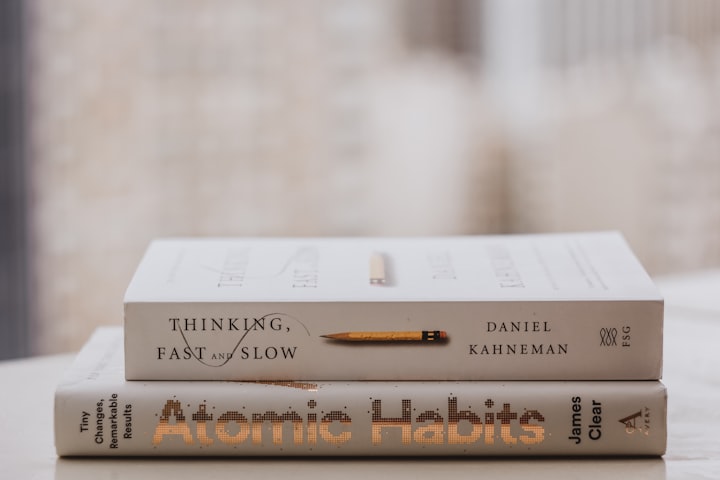I Didn't Love "Atomic Habits"... Here's Why
The opinion that I don't think anyone actually asked for.

Listen - Atomic Habits (the self-help book by James Clear) is a popular read, and it sat on my To-Be-Read list for the longest time. For context, there are over 300 books on my list, and there were a few I wanted to check off first. I was looking forward to it because the hype was so big. My youngest sister was gifted it for her birthday and I almost immediately asked her if I could borrow it.
I eventually found an audiobook copy this summer and decided to try it out so I could work on home chores and check off more books on my list. I mean, it was successful - I could do dishes, shower and meal prep while "reading".
And I'll be honest. I didn't love the book. I probably wouldn't recommend it to a friend. I wish I could say it was because it was an audiobook instead of a paper copy or even e-book.
None of the content felt original to me. I feel like I've given similar advice to my patients and clients when we talk about nutrition and building health-promoting lifestyles. I don't know that I would write a book about it.
There were a few things that I liked, and I will give credit where credit is due.
1. I liked reframing behaviour change as being able to make small improvements instead of expecting huge transformations. The concept of 1% better resonated with me, because I know I have occasions I can write better, push a little harder on the ice, or take that extra second to add something to my calendar to remember. Tiny things that add up after a long time, and become big transformations without the pressure of being dramatically different all at once.
2. I was happy to hear the consideration for the role of the environment on our habits. If you live in a shoebox apartment, it will be hard for you to separate some tasks from some spaces. And if you walk past certain places on your daily commute, this is going to impact how you think, act and feel on a day to day basis. We don't live in a vacuum, and our environment can be interactive to a point - not everyone has access to the same things.
3. Habit stacking is a popular technique I use in practice, helping folks include new positive habits alongside the ones they already feel really comfortable with. And setting specific goals to practice these new habits feels natural to me so I don't have any issues with the way this was discussed.
4. I actually really enjoyed the removal of motivation as a driver for change. Motivation to do things differently is great for the short-term, but doesn't facilitate long-term change. When we have days we are not "motivated" (whatever that's really supposed to mean), how can we still engage in positive habits? If we instead see our habits as easy, attractive, and satisfying, do we need to be motivated to do them or are they more comfortable and natural to us for their rewards?
Now, we have to talk about the uncomfortable part. The things that really missed the mark for me.
1. I absolutely hated the excessive and sometimes borderline violent fatphobia running through the whole book. In almost every example of habit change, there had to be some sort of mention about stopping overeating because it was making you gain weight, or dieting to "get fit", or exercising more so you could lose weight. It felt judge-y and shame-y, and gave zero context for the poor correlation between eating patterns and exercise alone on weight. James Clear also isn't a medica professional or nutrition provider to my knowledge, so he isn't someone I would turn to for health advice. For this reason alone I would not recommend this book to anyone with a history of chronic dieting or an eating disorder. This is not a safe read for eating disorder recovery.
2. Atomic Habits is not neurodiversity-affirming. If you have ADHD, engaging with positive behaviours can be riddled with decision fatigue, time paralysis, poor energy levels and overall executive dysfunction. Choosing a habit to work on may feel impossible, and having to balance new habits with the ones you already struggle to complete is discouraging at best. Being a partner to an "ADHDer", this isn't a book I would suggest.
3. The pathologizing of cravings for any and all behaviours just felt icky. If you want to watch TV when you get home, unplug your TV after every use - are you kidding me? If you want a donut on the way to work, go a different way to work - seriously? While I can appreciate that everyone is allowed to make their own choices, and these choices might be the denial of cravings, I have to admit that I feel this is just a waste of energy. It would be better spent finding ways to include the things you love in more supportive ways - setting timers for TV watching, eating regularly during the day and including a variety of flavours and fun foods, engaging in movement you actually enjoy. I think cravings can tell us a lot about what we like in life, and when the craving isn't an actively harmful thing, can we consider how having these things more available might actually facilitate better habits?
Maybe if I had read a physical copy, I would have had time to go back and reread different sections, make notes and consider if I was overthinking it. But maybe it also wouldn't be a good idea to take notes on building habits from someone who just simply made their own habits instead of studying it?
If you read Atomic Habits and loved it, I love that for you. But it won't be on my top list of suggested reads any time soon.
About the Creator
Emily the Period RD
I help people with periods navigate menstrual health education & wellness with a healthy serving of sass (and not an ounce of nutrition pseudoscience).






Comments
There are no comments for this story
Be the first to respond and start the conversation.